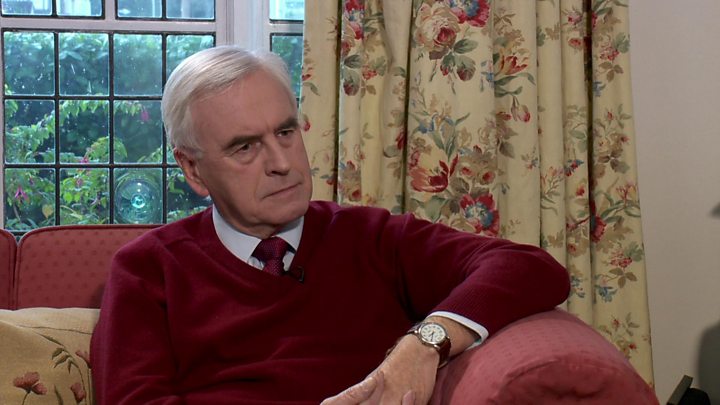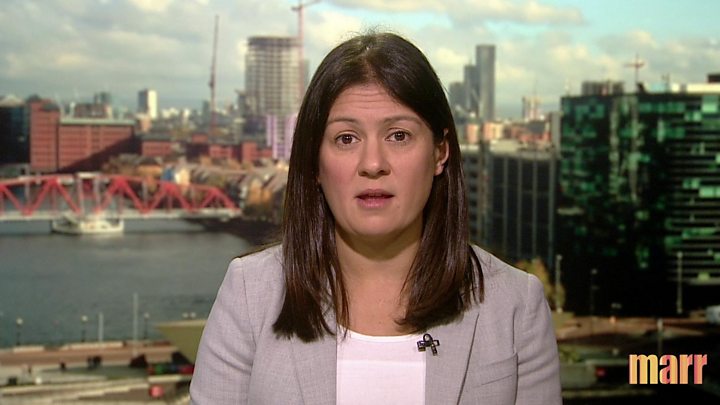
Media playback is unsupported on your device
Jeremy Corbyn and John McDonnell have apologised over Labour's "catastrophic" defeat in Thursday's election, which saw them lose 59 seats.
Mr Corbyn said he was "sorry that we came up short", while Mr McDonnell told the BBC he "owns this disaster".
The leader and shadow chancellor said they would step down in the new year.
The race for their replacements has already begun, with Wigan MP Lisa Nandy saying for the first time she was "seriously thinking about" running.
Mr McDonnell said it would be up to Labour's National Executive Committee to decide the mechanics of the leadership election, but he expected it to take place in eight to 10 weeks' time.
Labour suffered its worst election result since 1935 on Thursday and saw its vote share fall by eight points.
The Conservatives won a Commons majority of 80 - the party's biggest election win for 30 years - sweeping aside Labour in its traditional heartlands.
Mr Corbyn apologised to Labour supporters in two articles in the Sunday papers, calling it a "body blow for everyone who so desperately needs real change in our country".
Writing an open letter in the Sunday Mirror, he said he took his "responsibility" for the result, but insisted he remained "proud" of the party's campaign.
He doubled down in the Observer, saying his own election campaign had successfully re-set the terms of debate and his manifesto would be seen as "historically important".
But Mr McDonnell has argued "it's on me" as he apologised for the performance, on the BBC's Andrew Marr Show.
The shadow chancellor said he was sorry for "not being able to articulate" the party's campaign message ahead of the poll.
However, he also blamed the "media portrayal" of Mr Corbyn, saying "of course the system will throw the kitchen sink at you" if you challenge it.
Former Labour MP Caroline Flint - who lost her seat on Thursday - placed much of the blame at the leadership's door.
She also criticised the party's position on Brexit for leaving some voters behind, telling Sky's Sophy Ridge that "ardent Remainers", such as shadow Brexit secretary Sir Keir Starmer and shadow foreign secretary Emily Thornberry, "contributed to sacrificing" seats.
She accused Ms Thornberry of telling one her colleagues from a Brexit-backing area: "I'm glad my constituents aren't as stupid as yours."
Ms Thornberry said the accusation was "a total and utter lie". She added: I have never said this to anyone, nor anything like it, and I hope needless to say, it is not something I would ever think."
Ms Flint added: "I don't believe anybody who have been the architects of our European policy in the last few years is credible to be leader. I don't think they can win back these seats."
Instead, she said Ms Nandy and shadow business secretary Rebecca Long-Bailey were "worth looking at".

Media playback is unsupported on your device
Ms Nandy told the BBC's Andrew Marr she was considering a leadership bid after the "most shattering" defeat for Labour.
"In towns like mine, the earth was quaking as the entire Labour base crumble beneath our feet," she added.
Ms Nandy made a number of proposals - including moving the party's headquarters out of London - to help "rebuild that coalition" between "the Lewishams and the Leighs", and to regain a Labour Party that "speaks for both".
A number of other candidates are expected to join the race, including Salford and Eccles MP Ms Long-Bailey and Birmingham Yardley MP Jess Phillips.
Ms Phillips wrote in the Observer an appeal to people to join Labour to change it, arguing too many working-class people do not believe the party is better than the Tories.
Asked about the contenders, Mr McDonnell said he would "prefer others" to Ms Phillips, naming Ms Long-Bailey, shadow education secretary Angela Rayner and shadow women's and equalities minister Dawn Butler as possibilities.
He said Ms Phillips was "really talented", but added: "I want someone who actually has been really solidly involved in the development of existing policy - that's why Becky and Angie and Dawn and others have been so good."
Mr McDonnell said it "should be a woman leader next" and was "most probably time for a non-metropolitan" leader, adding: "I think it is time for a non-London MP, we need a northern voice as much as possible."
Shadow justice secretary Richard Burgon also backed Ms Long-Bailey and said he was considering running to be her deputy.
"Colleagues have approached me about that," he told Sky.
Back to the Commons
Meanwhile, the Conservatives are preparing for the first week of their new government.
Chief Secretary to the Treasury, Rishi Sunak, told Andrew Marr it was their "intention" to bring back Boris Johnson's Brexit bill to Parliament "before Christmas" - although he would not confirm the date.
"As soon as possible would be perfect," he said. "But obviously those conversations are happening between the relevant parties and the House authorities as we speak."
MPs will return to Westminster on Tuesday and begin the process of swearing in, before the Queen formally opens Parliament on Thursday.
Mr Johnson's Queen's Speech will include a commitment by the party to put its NHS spending plan into law as a symbol of commitment to the health service.
Downing Street has confirmed there will be a review of Whitehall departments - and the Sunday papers report that the prime minister will work over Christmas on plans to merge and split different government offices.
The Sunday Telegraph says the PM's chief adviser Dominic Cummings is preparing an overhaul of the civil service to ensure it delivers on Mr Johnson's agenda.
But Mr Gove said the government would not grant Scotland another referendum on independence, despite the success of the SNP in Thursday's election.
The party, which campaigns for an independent Scotland, won 48 seats - up from 35 - and its leader, Nicola Sturgeon, said she had "earned the right to pursue the plan" for another vote.
Ms Sturgeon, who is also First Minister of Scotland, said: "They will rage against reality for as long as they can but Scotland has chosen a very different kind of future than most of the rest of the UK, and they cant stand in the way of the will of the Scottish people.
"Fundamentally democracy has to be offered and respected."
Meanwhile, the Sunday Times claims up to a third of cabinet ministers face the sack in February, Whitehall departments could be abolished and civil servants replaced by external experts.
It's also been confirmed that the government has ordered a review to consider decriminalising non-payment of the BBC licence fee - which costs £154.50 annually.
What will happen this week?
Tuesday
Proceedings begin when MPs gather for their first duty: to elect the Speaker, Sir Lindsay Hoyle, who replaced John Bercow in November. Technically, MPs can hold a vote on this motion but this has never happened in practice.
Later in the day, the Speaker will begin the process of swearing in MPs, who are required to take an oath of allegiance to the Crown, or, if they object to this, a solemn affirmation. Those who speak or vote without having done so are deprived of their seat "as if they were dead" under the Parliamentary Oaths Act of 1866.
Two to three days are usually set aside for this process.
Thursday
This is the earliest possible day for Parliament's State Opening. The Queen's Speech is the centrepiece of this, when she will read a speech written by ministers setting out the government's programme of legislation for the parliamentary session. A couple of hours after the speech is delivered, MPs will begin debating its contents - a process which takes days.
Friday
Depending on how rapidly Boris Johnson wants to move, the debate on the Queen's Speech could continue into Friday.
This may be interrupted for a second reading debate on the Withdrawal Agreement Bill. MPs previously backed Boris Johnson's bill at its first stage but rejected his plan to fast-track the legislation through Parliament in three days in order to leave the EU by the previous 31 October Brexit deadline.
After the debate on the Queen's Speech is concluded, MPs will vote on whether to approve it. Not since 1924 has a government's Queen Speech been defeated.
Read more from the BBC's parliamentary correspondent, Mark D'Arcy
What is your question about the election results?
In some cases your question will be published, displaying your name and location as you provide it, unless you state otherwise. Your contact details will never be published. Please ensure you have read the terms and conditions.
Use this form to ask your question:
If you are reading this page and can't see the form you will need to visit the mobile version of the BBC website to submit your question or send them via email to YourQuestions@bbc.co.uk. Please include your name, age and location with any question you send in.
https://news.google.com/__i/rss/rd/articles/CBMiL2h0dHBzOi8vd3d3LmJiYy5jb20vbmV3cy9lbGVjdGlvbi0yMDE5LTUwNzk5Nzky0gEzaHR0cHM6Ly93d3cuYmJjLmNvbS9uZXdzL2FtcC9lbGVjdGlvbi0yMDE5LTUwNzk5Nzky?oc=5
2019-12-15 10:12:24Z
52780464144156
Tidak ada komentar:
Posting Komentar